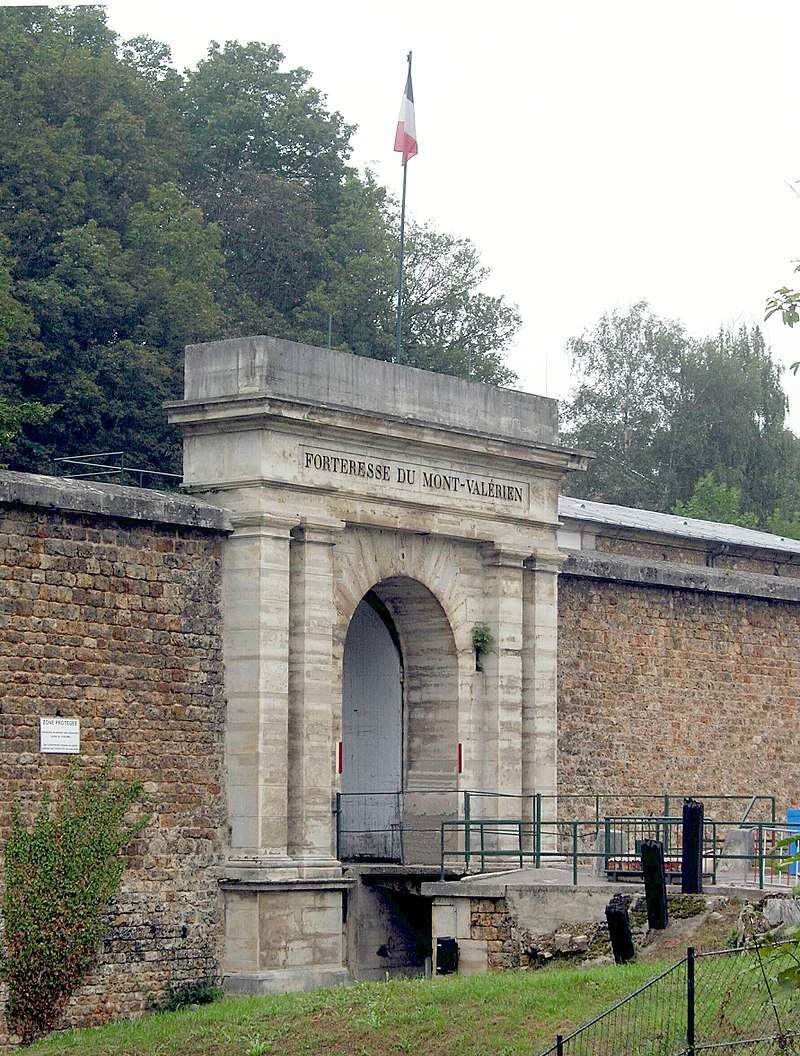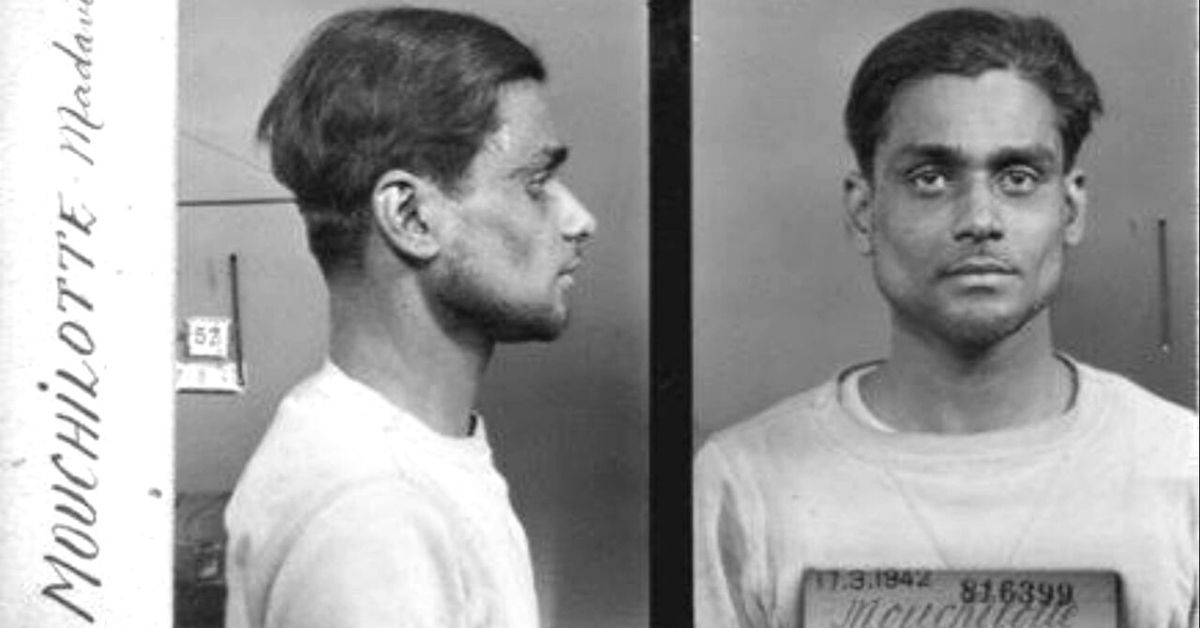Fort Mont-Valérien, a 19th century fort located in the Western subrubs of Paris, was used by the Nazi Germany forces to execute fighters of the French resistance and other hostages during World War II. Among those killed there was a once forgotten 28-year-old university student from the town of Mahe off the Malabar Coast in Kerala (but part of the Puducherry Union Territory) called Mouchilotte (also spelt Michilotte) Madhavan.
(Above image of M Madhavan courtesy Jesse Fink Books)
An active member of the French Communist Party (PCF), he was deeply involved in the French resistance against the Nazi regime during the height of World War II. Arrested on 9 March 1942 by pro-Nazi special brigades, he was eventually handed over to the Gestapo, the Nazi secret police, for his alleged role in a theatre bomb blast where two Nazi officers died. After suffering torture at the Fort de Romainville, a Nazi concentration camp, he was eventually executed by a firing squad on 21 September 1942. Despite his heroics, there have been neither memorials built in his name nor were there any programmes remembering his heroics in India.
So Who Was This Hero?
Born in 1914 in Mahe, a (former) French colony off the Malabar Coast, Madhavan was one of five siblings born to Coumarin and Madou Mouchilotte.
A member of Thiyya caste community, Madhavan completed his matriculation from a French school in Mahe, before proceeding to do his Bachelors in Pondicherry. Coming from a middle class family, Madhavan was first actively involved in the local politics of Mahe.
A turning point in Madhavan’s life came in 1934 when Mahatma Gandhi visited the French colony of Mahe. He had arrived there on a mission to uplift the Dalit community.
His trip inspired the creation of the Youth League in French Indian territories and set the scene for their own freedom struggle. Madhavan joined the Youth League in Mahe before moving to Pondicherry for higher studies. Here he joined the Harijan Sevak Sangh, an organisation Mahatma Gandhi had founded to help members of lower castes access education and temples.
A common practice in French colonies across the world back then was that the brightest students in universities were invited to study at the prestigious Sorbonne University in Paris. Madhavan enrolled at the Sorbonne University in 1937, a few years before Nazi Germany invaded and occupied of France. Inspired by their spirit of resistance against the Nazis, Madhavan joined the French Communist Party and became a member himself.
According to noted British-Australian non-fiction author Jesse Fink:
“In 1937 he went to Paris to study mathematics [or engineering according to other accounts]. He lived in the Cité Universitaire, a hotel for students at Rue Émile-Deutsch-de-la-Meurthe in the 14th arrondissement. There he spent many nights walking around Paris with Varadarajulu Subbiah, who went on to become secretary of the Communist Party of French India. The Government of India released a stamp of Subbiah in 2011. He is considered one of the heroes of independence from Britain and a statue of him stands in Pondicherry (Puducherry) today.”

Resistance Hero
Not too much is known about his time in France except for the diary of a fellow prisoner of Madhavan PS Shamop, which the The Asian Age accessed for their 2016 article. According to Shamop’s diary notings, the Gestapo took Madhavan along with 115 others from the camp.
“All were handcuffed and when they were boarding the vehicle, the rest of the prisoners wished them bon voyage. As Nazis had declared that no one would be given capital punishment, everyone was under the impression that Gestapo was extraditing them to some other part of the world. The prisoners sung La Marseillaise, the French national anthem. All of them were carried to Mont-Valerien where they were shot dead and the corpses were burnt,” the diary notes.
However, Jesse Fink, goes on to note in his blog, how Madhavan had the opportunity to escape from captivity by declaring that he’s Indian. But Pierre Serge Choumoff, a fellow prisoner, said that Madhavan refused and told his Nazi torturers that he was French. Before his execution, he said his final goodbyes to Giséle, a French hotel maid, who he fell in love with in Paris. The couple wanted to get married after the war but she eventually died in Auschwitz.
“[Madhavan] Mouchilotte was marched by two SS officers, tied to a pole and shot dead without a blindfold at Mont-Valérien, Paris, along with 45 of his comrades who had been killed on the orders of French Nazi leader, Höherer SS und Polizeiführer Carl Oberg. Their bodies were burned. Seventy more resistance fighters were killed in Bordeaux,” adds Fink.
Madhavan died a hero of the resistance and his name is inscribed at the Mémorial de la France Combattante (Memorial of Fighting France) at Fort Mont-Valérien in Suresnes, Paris, among scores of others who battled and resisted the occupying Nazi force.
Beyond this not much is known about his time in captivity. Some claim he was the only native-born Indian executed by the Nazis, but we don’t know that for sure. The famous spy, Noor Inayat Khan, who was executed by a firing squad in 1944, was born in Moscow.
What we know is that he was only 28 when he was killed, fought against a tyrannical regime in defence of freedom and the people of Mahe haven’t forgotten his contributions.
Maybe, it’s time we did more to remember this young man’s fearless contributions.
(Edited by Yoshita Rao)
Source material for the article: Twitter/Advaid, The Asian Age, Jesse Fink Books, Manorama
Like this story? Or have something to share? Write to us: contact@thebetterindia.com, or connect with us on Facebook and Twitter.
We bring stories straight from the heart of India, to inspire millions and create a wave of impact. Our positive movement is growing bigger everyday, and we would love for you to join it.
Please contribute whatever you can, every little penny helps our team in bringing you more stories that support dreams and spread hope.

